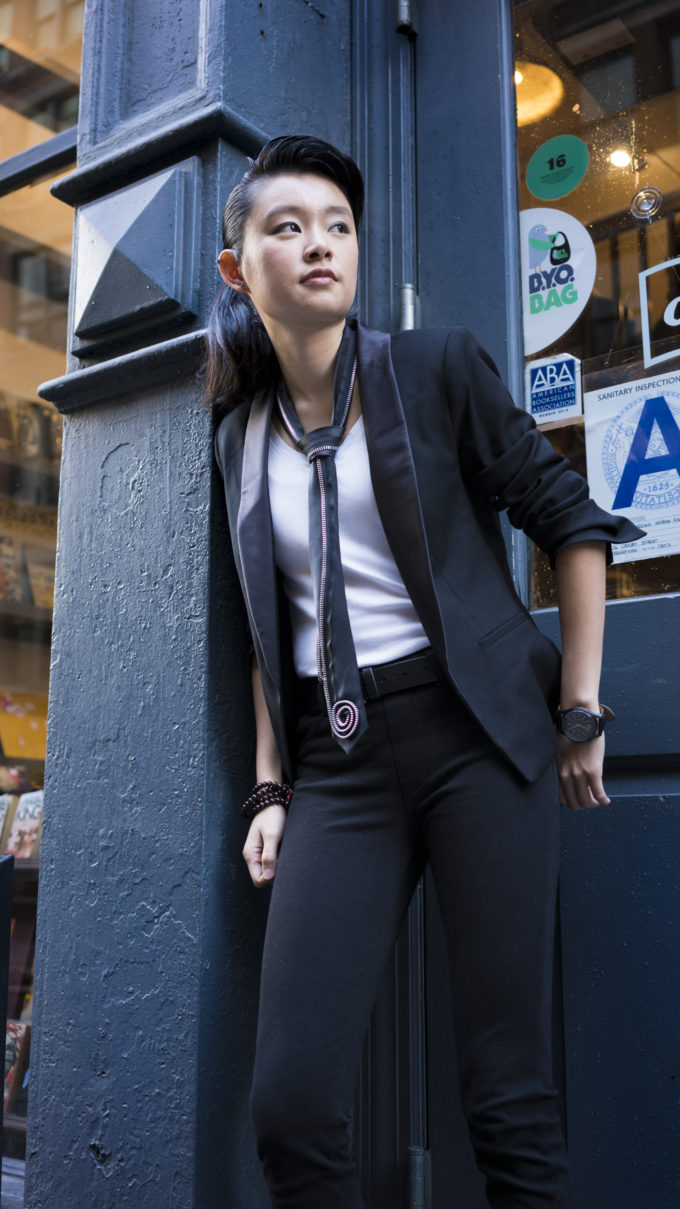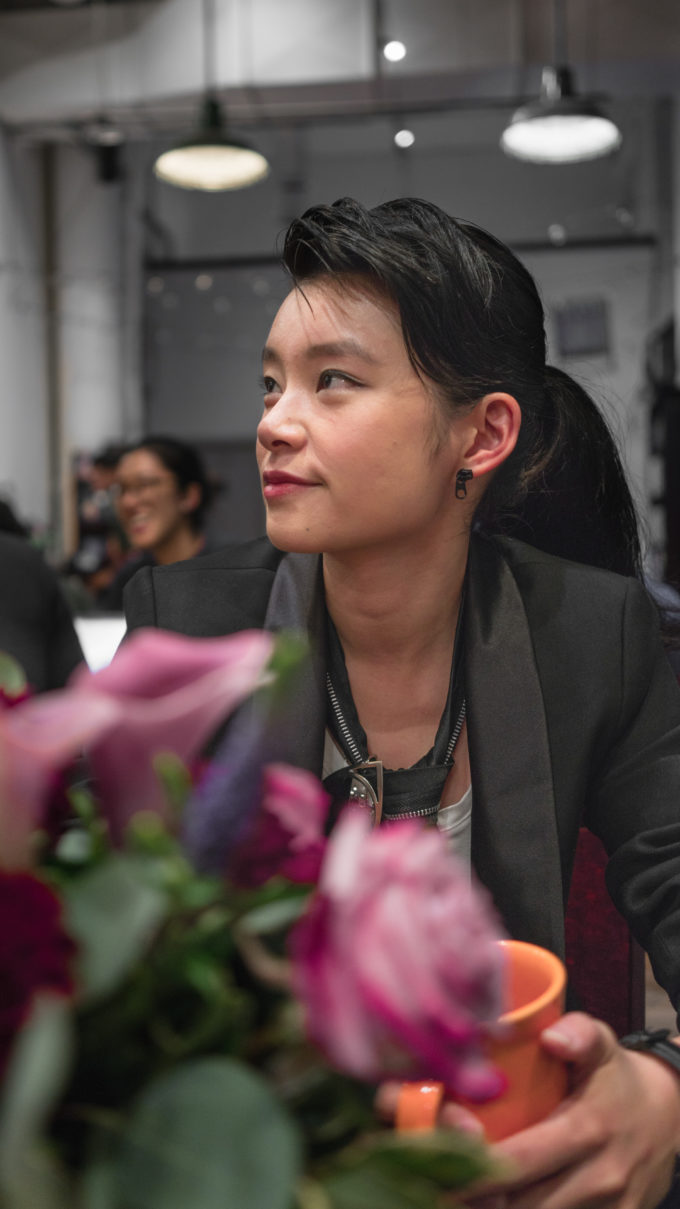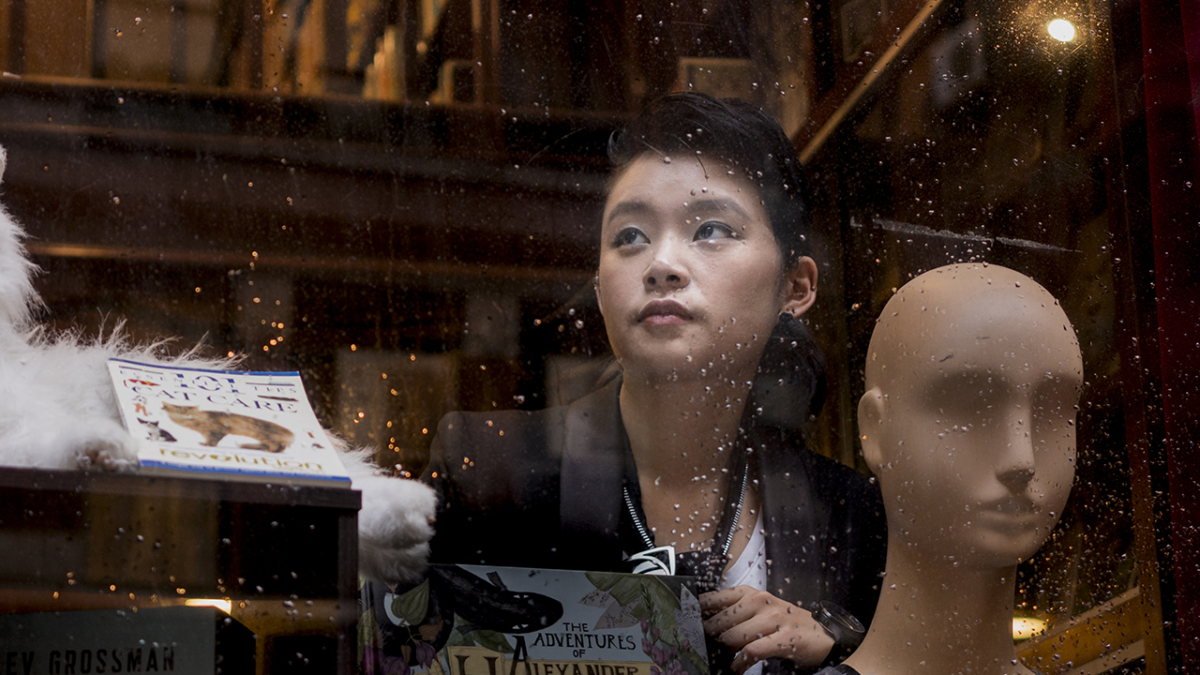Written By: Saiya Floyd
The first thing that strikes you when you see Celia Au in person is that she’s cool. She strides into Housing Works Bookstore and Cafe in SoHo, in a mostly black ensemble (a requisite for any New Yorker), made unique with bold accessories: leather tie with metallic details, zipper earrings, minimalist bracelets. She’s the kind of cool that might be intimidating if upon approaching the table, she didn’t offer a firm but friendly handshake and exude a natural warmth. Within five minutes of listening to her speak, in which she punctuates her answers with frequent laughs, it’s clear that Celia is not just cool — she’s also charismatic as hell.
Audiences might have seen her most recently in Netflix’s “Wu Assassins” where she played supernatural guide Ying Ying, but Au has been working steadily for the past few years with films like “Revenge of the Green Dragons,” “People Places Things,” “In a New York Minute,” and TV shows like “Iron Fist” and “Lodge 49.” “As long as I feel like the writing’s great, the director has a good vision, I’ll mostly say yes to a project,” says Au. “… I feel like my biggest thing in this industry so far [is] we have the power to create and express and to send a message out, and I want to send stuff that sends a positive message out … the world’s already fucked up, so spread positivity rather than negativity.”
For one of her upcoming projects (working title “Like Family,” now tentatively titled “The Space In Between”), Au was enticed not by the film’s writing, as she was not shown a script, but by the director, his vision, and the concept: a coming of age story, following a group of five friends. “Every season you see them ten years later. So they start in their 20s and end in their 50s. I was like ‘huh, that’s an interesting concept.'” Filming happened in New York, Philadelphia, New Hampshire, India, with additional filming slated to happen in Colombia. “That was an eye-opening experience. Being able to go to India was very very fun and interesting. And I got bullied by a monkey. That was the highlight of the trip.”
Travel comes with the territory of Au’s work. Even before she started acting, Au had a very international background, having moved to New York from Hong Kong when she was almost four years old. “I remember Hong Kong, running around Victoria Park. Which is interesting because my dad and I used to run around the park all the time and I can map out certain parts of the park … that’s all I remember, like the little snippets of stuff.” Au visited Hong Kong for the first time since leaving six years ago expecting to reconnect to her roots, but found the experience jarring. “I was like, ‘this is like New York City on crack. This is a lot right now.’ And it was way more fast paced and there were a lot more people and I was claustrophobic.” After having lived here for most of her life, New York is the place that Au calls home, which the trip reaffirmed. “I have my family here, my friends are here, my friends I grew up with are here.”
So perhaps it’s not surprising that unlike many other film and television actors, Au has not felt the need to move to Los Angeles. “I feel like when you’re in LA, you’re just working, and then in New York, you’re just back home and chilling … Even though I have some really good friends in LA, it’s more comfortable being in New York. I get to walk, I don’t need to drive everywhere. I get to take a subway if I want, I get to drive if I want, I’m not constrained and just doing one thing.”

One thing Au does make time for is binging TV. Au lists “Black Mirror,” “This is Us,” “The Good Doctor,” and “Atypical” as just a few of the shows she loves. She also just finished binging “Chernobyl” and “Euphoria.” It’s surprising that Au has kept up to date with her TV watching while juggling her busy schedule. “That’s why you gotta binge it,” she says with a laugh. “I’m the type of person that if I start binging, I won’t stop; I gotta finish it.” Au also enjoys exploring different kinds of cuisine and restaurant hopping. “I want to say most of my paycheck goes to food.”
Food is one way that Au and her “Wu Assassins” coworkers bonded off-set. It started with castmate Katheryn Winnick suggesting the cast get drinks to get to know each other before filming, and quickly evolved into hot pot nights at different cast members’ homes. “I would say like Lewis, Lawrence, Lili, Juju and I were the core group that cooks a lot and were always with each other, hanging out, cooking. [We would] be like ‘hey I just wrapped, I’m cooking’ and they’re like ‘oh coming over after work!'” The dinners created a family bond between the actors, stunt team, and directors. When the showrunner heard about the dinners, he reached out to Au, wondering where his invite was. “I was like ‘Are you back in Vancouver?’ and he was like ‘I will be’ and I was like ‘Fine, when you’re back, we’ll have a hot pot party with you.'” She added about “Wu Assassins,” “It doesn’t feel like work at that moment. Just everyone is having fun while you’re making a show.”
Another part of making the show is the fight choreography that goes into it. Au had martial arts experience prior to being cast, having practiced Kung Fu for about five years. But initially, she had no interest in learning martial arts. “For a really long time I was fighting the fact that I’m an Asian actor. And I was like ‘Not all Asians know how to fight!'” She resolved to be an actor that didn’t have combat or martial arts training. But her own love of action meant she kept auditioning for action roles. “They (the casting team) were like ‘Do you know how to fight?’ And I’m like ‘No … but I want to learn.'” Au decided to learn martial arts so that next time she walked into an audition room, she could say “‘Yes I know how to fight.'”
Au’s decision led her to start training in Kung Fu. Growing up, her parents owned a video store, so she would watch a lot of classic Jet Li, Jackie Chan, and Donnie Yen films. “My brother and I would pretend to play fight all the time, like pretend that we knew Chinese Kung Fu.” The visuals of Kung Fu, as well as the more philosophical aspects interested Au. “I feel like Kung Fu has a connection to philosophy and Buddhism, even though I’m not religious, I find it fascinating.”
She started training at Tak Wah Kung Fu in Chinatown, where she began learning the basics of Shao-lin Kung Fu, but has since learned other forms. One of the things Au enjoys about Kung Fu is its descriptive nature and how it questions why a move is done a certain way. “My sifu specializes in the Tiger form, and they’re like why the tiger? What did they study from watching the tiger attack and how do we incorporate that into Kung Fu?” She adds, “They’re not just telling you to just do it, they actually describe to you why and how the animals act and why you would strike a certain way. It’s a lot easier and it makes a lot more sense to me.” In addition to Kung Fu, Au has also studied Wing Chung. This led to her eventually booking roles on “Iron Fist” and “Wu Assassins.”

Other special skills Au has in her back pocket that have come in handy with her creative endeavors? Graphic design. A few years ago, Au worked on “Extraction,” a VR film, with another friend after they discussed experimenting with VR at a party. Au had the idea to tell the story from the point of view of a person witnessing a rescue mission. The relatively simple idea came with challenges. First, the production team had to figure out how to film the footage from the multiple angles needed for the film. (“We built a motorcycle helmet and strapped the camera on top of the helmet, but then had hair underneath it so it looks like you’re part of the head.”) Then after filming for 12 hours, the team began editing, which took 100 hours. The arduous editing process had to incorporate footage from seven different cameras stitched together. “Extraction” was made in the early days of VR, so this brought on another set of problems. “I’m not sure if you’ve seen earlier VR stuff — there’s always stitching problems when you’re looking at a flower and it’s like split in half and you’re like, ‘Well that’s fake.’ So we were trying to find ways to stitch it back together. And I was a graphic designer so I used some of my graphic design skills.” Together with her friend’s editing skills, and another friend’s CGI skills, they managed to clean the stitch lines. “That was a really fun project, but it’s just very, very, very time consuming,” says Au.
Despite that, she’s still interested in building out more behind the scenes skills. “I always feel like, if you’re just an actor, you only know one perspective and one side of the story. Meanwhile, it’s teamwork to make a film happen.” When starting out, Au took internships at production and post-production companies as well as casting offices, and used these as learning opportunities. “When I’m on set, I’m like at the DP, asking ‘What camera is this? What lens is this? Tell me all about it.’ … I think it makes you a better and more well-rounded actor if you know what’s going on all around you. Because sometimes I feel like as an artist you’re so focused on yourself, and you’re like what am I doing wrong, why are they doing this? And then you start questioning everything. But if you can step out of your own shoes, you’re like, oh, I understand why.”
Au has also written several projects, including some with friends, including some they hope to get made. When asked for more details, Au demurred “Let’s not jinx it yet!” She did discuss the need for more genuine stories in order to keep the momentum of showing more diversity in the film and television industry. “I think that we need more filmmakers to keep telling stories in order to keep us viable.” As to who should be telling these stories, Au doesn’t think there should be limits placed; while at ComicCon, a fan asked if she as a Black American could write a Chinese story. “I’m like yes, of course you can, because if I want to write a Black American story, I want to be able to write those characters; if I want to write about white Americans, I want to be able to do so as well. Just do your own research and make sure we’re represented correctly.”
That being said, Au was wary of being too attached to labels. While discussing diversity with a Canadian friend, she was surprised when he said it was interesting how Americans put labels on everything. “He was like ‘You realize that it’s because you put labels on everything that’s why you guys are segregated, right? And then there’s racism and there’s all these kinds of segregation between different groups … When you deal away with that word that will put you in these little niche boxes, then you open up to this wider world where people aren’t judging you for who you are because you’re Asian American versus white American versus Black American. You’re just American.'” This resonated with Au. “Can we just get rid of these labels and just call ourselves American? And I think there would be less discrimination as well.”
A world where Asian actors aren’t boxed into only Asian roles shows how far representation has come in the past few decades. When Au was a child, she was surprised to see Trinity, the Yellow Power Ranger. “I was like ‘Hey! She’s like me! She’s an Asian female that’s kicking ass.'” She loved the character so much that when she first started acting and her first agent asked her what was her goal, she told them she wanted to be a Power Ranger. And if she couldn’t be a Power Ranger, she wanted to be a superhero, and everything in between. “You’re getting paid to play pretend. How amazing is that? It’s like, as a kid, you play pretend all the time, and now, as an adult, you can make a career out of it. So I think the more versatile an actor you can be, the cooler and the better.”
Au will show off her versatility in a slew of upcoming projects: “Made in Chinatown,” “Snakehead,” “Shoplifters of the World,” “The Space In Between,” and much more.

